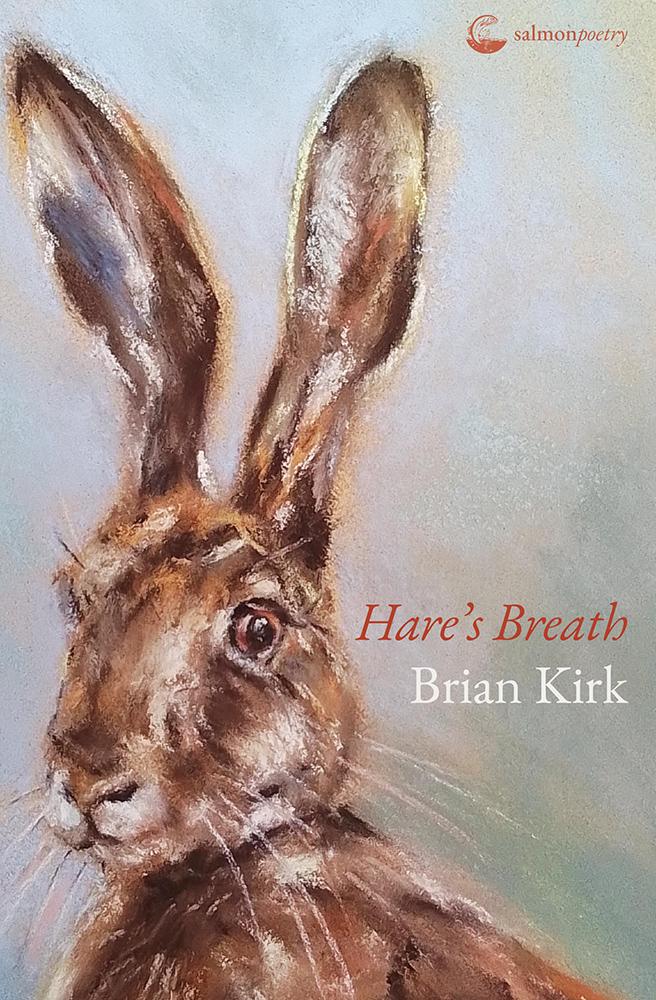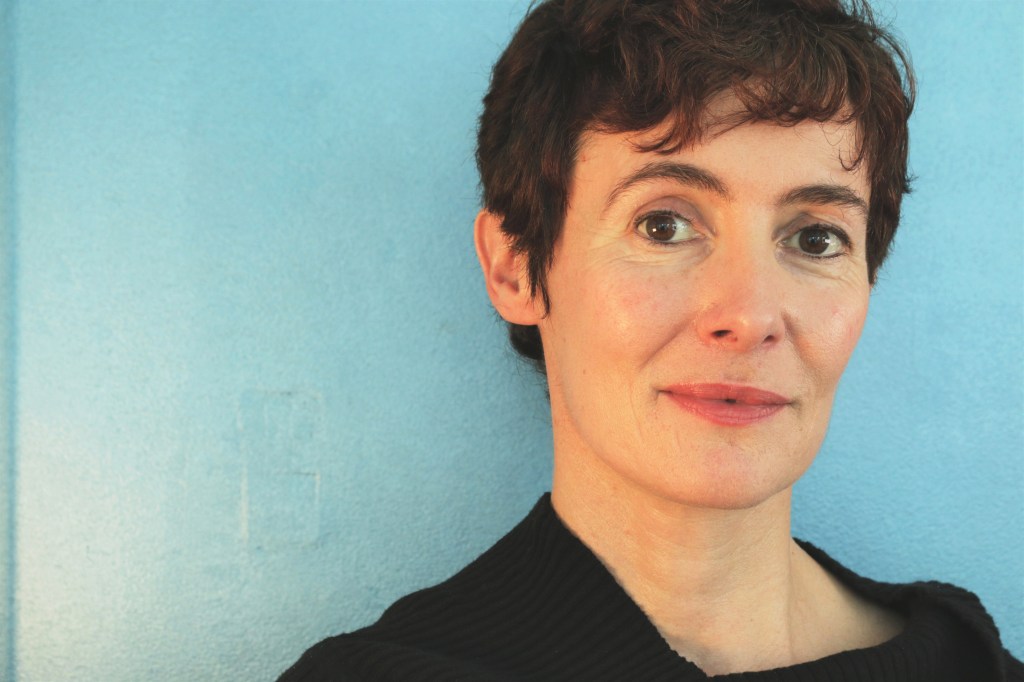Maeve, Welcome to Writers Chat. We’re going to discuss your poetry pamphlet Body as a Home for This Darkness (Book Hub: 2023) which, although a personal tender and moving homage to your late father, is also a consideration on the passage of time and grief. I might add also a congratulations on being placed as a finalist in the 2023 Gregory O’Donoghue poetry prize!
SG: Firstly, tell me about the title which seems to encompass the entirety of the collection – notions of body, ageing, time, belonging, family, and the darkness of grief. In the process of putting the collection together, where did the title come?
MMcK: Thank you, Shauna, for your kind words. Yes, you are right, Body as a Home for This Darkness encompasses all you say of body, ageing, belonging and family and is also a reflection on the loneliness of loss and grief. Both are constants in life and yet are something we tend to shy away from. The title of the pamphlet came from a haibun poem I wrote four years before my dad passed away. Dad was no longer the man we once knew yet he became the only man we had left and the title spoke to me of that reality and how dementia strips away the very essence of a person.

SG: Body as a Home for This Darkness opens with the poem “Him” which introduces us, character-like, to your father. I love your use of lists that paint photographic stills of the man, living, giving, enjoying life until his hands are “grey as putty. In ours.” Could you talk a little about the placement of this poem and its formation?
MMcK: It was important to me during the proof-reading and editing process to begin this book with a memory of my father as the man he was before his diagnosis. Dad was a vital man in our world. He was loved dearly, by his family and friends. He was important to so many. While many poems focus on his later life; ten years in the care home as we lost him slowly, my siblings and I remembered our younger lives and the happiness of those times. Dad was a man of his time, the provider who worked hard and never complained, the one we looked to for advice, the person who made everything ok. The poem ‘Him’ attempts to capture and give the reader an insight into the younger man, the father, the worker and the everyday things that made him who he once was.
SG: And I think it captures all of those things about your dear father. Nature features in your collection, as a harbingers of news. In “Rain knows of Waking”, “Blades of grass are scissors wielding tears”, disturbingly (but accurately), “sadness amputates mind from the thinker” until at the end, “raindrops preen in the reflection of your surrender.” You capture something profound about illness and the loss of control. Do you think that when we’re going through events like this that our powers of observation become more focused on the immediate surrounds, that blades of grass, for instance, take on a deeper meaning and significance, and that in writing these experiences into poetry we are already starting the healing process?
MMcK: Nature features in many of my poems. Something about the temporality of nature, how it comes and goes and regenerates itself year after year, allows me to better understand our human existence. An autumn morning spent in a forest observing the acceptance of an oak tree as it slowly retreats and to return there in spring to watch foliage sprout and burst with colour reminds me of life, the brief time we are here and whilst here there is joy but also challenges that we must accept. I am happiest lost in the woods or strolling along a beach listening, touching and absorbing all the elements around me. Of course to write we must observe keenly, and the image you refer to, ‘blades of grass are scissors wielding tear’ came from an early morning walk in late November near the care home as my father entered the last days of his life. I stopped to watch dew rest on blades of grass and they were tears, mine, but this was the order of nature and the blades of grass bore the weight of the dew with stoicism.
SG: Yes, we can take so much from the order of nature. In the devastating “Leaving”, you capture the solitude of grief, where you get lost on the M50 with your family including
three almost/grown children, tight, really tight…fast asleep
leaving you alone in and with your grief, and leaving you to find your way home. In the title poem, “Body as a Home for This Darkness”, we have more movement, of body, of task, of help as well as dropping back into memory and connection.
Once, you made raspberry jelly when my throat/hurt I’ll ask if I can bring you some…
These poems really stuck with me and I’m curious about your stylistic choice of form. Can you talk about this?
MMcK: Poems often choose their own form. I like to experiment with different forms in second or third drafts. In the case of ‘Leaving’, I felt the form I settled on, a justified block of text, allowed the poem to give the sense of claustrophobia I felt that day driving home from my dad’s funeral. It was in lockdown, we were allowed just ten mourners at the funeral and because of restrictions we had to leave immediately after. The loneliness of that journey home, even though my family were with me in the car, will remain with me forever. Similarly, in ‘Body as a Home for This Darkness’, I wanted the poem to appear solid on the page, that the reader would not be distracted by the format. It is a haibun and I wanted the haiku at the end to convey my dad as a younger, working man, a panel-beater and sprayer, who worked so hard to provide for us.
SG: Thank you for such insight into your process, and your terrible grief. The theme of clothes, how they sit on the body, and how we people are mere movements of clothes is threaded through the collection. I’m thinking here of “Listening for My Dad’s Clothes” and “Three Piece Suit in Rome” which ends with the question so many of us have to ask “Which shirt and tie will we bury him in?” Was this intentional or did this theme emerge when you went to put the collection together?
MMcK: A friend who I share work with pointed this out to me after reading a draft copy of the manuscript. I hadn’t noticed it prior to that. My dad was a dapper man, I never saw him in jeans or a tracksuit! He was neat and tidy and always colour coordinated. Subliminally, this came through in the poems. Many readers have remarked on this and I am glad as this sense of my father always being well-groomed would have delighted him.
SG: That’s lovely – as it also reveals something light and yet shows us the care your dad took not only with his family but himself. There is a nostalgia – through the grief – that your poems also capture, alongside the stark reality of death. For example, the sequence of action in “Breathe” that ends with the heartfelt “What sadness/you taught us to count”, or the visceral “Fortuity” or “Unprotected” where your father’s hands don’t know your hands have released his. In the wonderful “I Want To Go Home”, you capture an almost universal desire that many of us feel at some stage, that we want, not just to go “home”, but that we want to go back to the past, or rather a past without difficult feelings, without loss, without the responsibility of death. Have you – or could you ever? – read these poems aloud? I felt tearful reading them with the rawness.
MMcK: I’ve read ‘I Want To Go Home’ a few times. It is a long prose poem, but is always well received. Audiences seem to like the detail and many have said how the images in the poem resonate with them. As a Dubliner who moved to rural Ireland many years ago, when I visit now I see the city so vividly while also remembering the Dublin of my childhood. And you are right, the poem is about wanting a time that is gone, however good or bad that time was, before the realities of life as we age emerge. I’ve also read ‘Protected’ many times and it is a favourite poem of mine to read. I haven’t read ‘Fortuity’ or ‘Breathe’, two short poems, but look forward to in the future.
SG: We will end with a few light questions:
- Coffee or Tea? Tea, but no more than two cups a day. Water mostly.
- Sea or Mountains? Sea.
- Longhand or straight typing? Both, I write on the hoof in jotters, and at home on the laptop.
- Cats or Dogs? Dogs. Our two much-loved dogs, Buddy and Pablo passed away in 2020 and 2022. Both aged 15, they had a great and long life. We miss them still.
- What are you working on now? I am currently working on my first full collection which will be part of my dissertation for the MA in Poetry I am currently undertaking at Queens University, Belfast. I am also exploring a long poem book. I have an early draft of a ten-page poem I would like to develop into a full book.
Thank you for your generous answers, Maeve and I wish you continued healing and much success in your MA in Poetry. I look forward to reading more of your work – especially the full collection, when it is published.
Readers can purchase Body as a Home for This Darkness (Book Hub: 2023) here.






